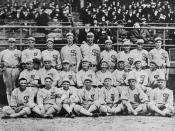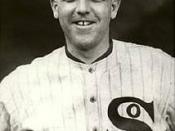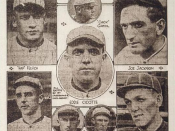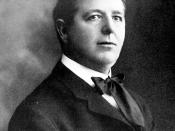The "Black Sox"ÃÂ scandal took place in time where people lived for baseball. When the scandal hit the newspapers, people were stunned. Most of the country turned their backs on the game. The people of America felt betrayed and had no idea what to do. The entire country had the same question. What pushed them into the gamblers arms? The best answer is Charles Comiskey, The White Sox owner. Every other reason is a direct result of what Comiskey did to his team. The purpose of this paper is o illustrate exactly why the 1919 Chicago White Sox threw the World Series and how it affected baseball in American culture.
The Chicago White Sox Owner, Charles Comiskey was a key reason The "Fix"ÃÂ took place. He treated the players with very little respect and paid them very little. The White Sox were, by far, the best team in the league, but they were paid like they were the worst(Black Sox).
During World War I a league-round salary cut was implemented because of decreasing attendance. When the attendance numbers rose after the war every owner except Comiskey brought the salaries back up. When the players notice this they planned a strike. They knew it was useless talking to Comiskey because he never discussed contracts. The strike was narrowly avoided because the manager, "Kid"ÃÂ Gleason, who had a dispute about his contract the previous season, convinced them ot to. Out of all the players on the team only one had a decent contract. Eddie Collins had a $14,000 salary which was written into his contract before he was traded to Chicago. His salary was almost twice the amount of any other player on the White x. One reason why the players on the White Sox had such low salaries was because most of them were uneducated. Joe Jackson's signature, for example, was a simple "X"ÃÂ. Collins, on the other hand, was a Columbia University graduate. That alone created nimosity towards Collins(Crisis). Another reason Comiskey was able to pay such low salaries was the "reserve clause"ÃÂ which was in all of his players contracts. The clause made it impossible for a player to change teams without their owners consent. T refore, the owners had all the bargaining power(Black Sox). Comiskey's stinginess was exemplified when he charged the players to wash their uniforms. When the players were informed of the plan they were outraged and refused to wash their uniforms for veral weeks. Comiskey finally had to break the locks off of each locker to have the uniforms cleaned. Their nickname The "Black Sox"ÃÂ was actually created because of how dirty they looked, but the scandal made it stick. The reason why none of this was nnounced to the public was because Comiskey was bribing certain media members by paying for their meals. What was somewhat amusing was the fact that while the media received free meals, the players received less meal money than any other team in the le ue(Crisis). It was this type of behavior on the part of Comiskey that forced the White Sox into the gamblers arms (Bjarkman).
Although society frowned at gambling on baseball, they also listed the odds in the newspapers, which encouraged people to gamble. When a player saw the odds, he was encouraged to fix games because of the money that could be made(Bjarkman).
Comiskey even had signs posted inside the ballpark stating "No betting allowed in this park"ÃÂ(Black Sox). Although he tried, he did not detour many gamblers with the signs. Arnold "Chick"ÃÂ Gandil, the "Black Sox"ÃÂ ring leader was the first to contact a g bler about a fix. About three weeks before the World Series, he met with Joseph Sullivan, a small-time gambler who he met in Boston, about throwing the Series. Gandil said he would do it, but it would cost $100,000. Gandil wanted asked for $100,000 b ause he needed to convince several other players to join in for it to work and the money would convince them to help(Black Sox). "Chick"ÃÂ approached Sullivan because he was the only one who Gandil believed could raise the money he wanted (Crisis). Afte the meeting, Gandil went to convince his other teammates. Gandil needed at least two pitchers, so he decided to try both Eddie Cicotte and Claude "lefty"ÃÂ Williams, who combined won 52 games that season. Cicotte had a grudge against Comiskey and took t s opportunity as a pay back. Comiskey promised Cicotte that if he won 30 games that season he would be paid a $10,000 bonus. After Cicotte won 29 games Comiskey benched him and told him to rest for the upcoming pennant. Cicotte requested $10,000 for e fix so he could have the money that was promised to him(Black Sox). Gandil then went after Charles " Swede"ÃÂ Risberg, and while talking to him Fred McMullen approached them and wanted in on the fix. "Chick"ÃÂ wanted another pitcher, and so he went to aude "Lefty"ÃÂ Williams. "Lefty"ÃÂ did not believe the Series could actually be fixed, and wanted some time to think about what he should do. Once he found out that Cicotte was in, he jumped aboard as well. "Chick"ÃÂ then went after the White Sox three bes hitters: Buck Weaver, "Shoeless"ÃÂ Joe Jackson, and Oscar Felsh. Cicotte met with Bill Burns, an old baseball friend, who heard rumors about the fix and wanted in. After Burns was in, he, Cicotte, and Gandil met with Billy Maharg. They told Maharg that hey were going to throw the Series for $100,000. Since none of the gamblers involved could find that much money on their own they went to New York to find someone. The man they found was Arnold Rothstein. Maharg and Burns met with Rothstein's associa , Abe Attell, about the fix. Attell then went to Rothstien and explained what was happening , but Rothstien did not think it would work. After some deliberating, Rothstein finally agreed to help out(Crisis). He ended up providing most of the cash th was needed to push the fix through(Black Sox). The players first contact with the gamblers took place on September 17, at the Ansonia Hotel in New York. The team was on its last east coast road tripof the season. Cicotte had discussed the fix on sev al previous occasions with his irritated teammates. The eight players involved at this time all shared a common hatred towards Comiskey and were very envious of Eddie Collins' wealth(Bjarkman). Burns was left three days to make the deal before the Ser s began. Rothstein sent $40,000 to Sullivan before the Series, and put another $40,000 in a safe until after he knew the fix was actually going to happen. The $40,000 was for Gandil to be split up among the players, but Sullivan bet $30,000 on the Ser s. When Sullivan gave Gandil what was left of the $40,000, he said that someone must have leaked some information and that was why he was receiving such a small amount of money. Gandil gave all the money to Cicotte, because that was the amount he dema ed before the Series began. Later that week, Abe Attell talked to all the players and told them the money was now going to be given in payments after each game they lost. All the players except Cicotte were upset. Cicotte did not mind because he had ready received his money. When the Series was finally over and the White Sox lost, Sullivan gave Gandil the $40,000 that was in the safe. The players received a total of $70,000 instead of the $100,000 they had asked for, and of the $70,000, $35,000 w t to Gandil(Crisis).
The two players whose involvement is most disputed is Joe Jackson and Buck Weaver. Jackson supposedly turned down Gandils first offer of $10,000 to help throw the Series(Black Sox). Gandil then offered him $20,000, which Jackson again refused saying it was not enough to do a "dirty deal"ÃÂ(Bjarkman). After that meeting Gandil told Jackson the fix was going to happen with, or without him. Gandil left him with the offer and told Jackson he could take it or leave it (Black Sox). After at meeting, Jackson supposedly decided he would help out if he was paid $5,000 after each game(Bjarkman). This part of the scandal is believed to be made up by Gandil. The gamblers wanted Jackson involved because he was the star of the team and it wou help convince other players to come aboard. Jackson never went to any of the meetings, but Gandil told the everyone at the meetings that he was still involved. In the end, it was discovered that Jackson had no involvement other than knowing the fix w going to take place. Even the gamblers said they had no recollection of him being involved. When the Series was over Gandil gave him $5,000. The only reason Gandil did this was to make it look like Jackson was involved. Jackson, who was baffled whe he received the money, went to Comiskey to find out what he should do with the money. Comiskey refused to see him because he was so disgusted. The other player whose involvement is questionable is Buck Weaver, who actually attended some of the meeting between the players and gamblers. Although he knew about the fix he did not participate in it in any way(Black Sox).
After the Series was over Comiskey offered $10,000 reward for any hard evidence that the World Series was fixed. Despite the fact that he had no intention of paying the reward, he still received the information he asked for (Schoor). The first player to confess was Eddie Cicotte, whose cofession was followed by Joe Jackson's. "Chick"ÃÂ Gandil denied having anything to do with the fix, along with Arnold Rothstein(Crisis). It took one year for the evidence to make its way to the Chicago grand jury. T majority of the evidence included the confessions of Eddie Cicotte, Claude Williams, and Joe Jackson. Any evidence concerning the gamblers, Abe Attell, and Arnold Rothstein was also included. The case against them looked promising until all the evide e including Cicotte, Jackson, and Williams signed confessions were stolen out of the district attorney's office. The district attorney had to build a new case against the "Black Sox"ÃÂ and a majority of the case was put together by Ban Johnson. All John n's work was for nothing because on August 2,1921, the players were acquitted of any criminal wrong doing(Schoor). After the verdict was read all the parties involved seemed happy. Comiskey still had his team intact, and the fans had their faith in ba ball restored. Despite the fact that everything seemed once again back to normal, the new commissioner, Judge Kenesaw Mountain Landis, wanted to take one more step. The day after they were cleared of any wrong doing, all eight players were banned from rofessional baseball forever(Nemac). Landis explained "Regardless of the verdict of juries, no player that throws a ball game, no player that entertains proposals or promises to throw a game, no player that sits in conference with a bunch of crooked pl ers and gamblers where the ways and means of throwing games are discussed and does not promptly tell his club about it, will ever play professional baseball"ÃÂ(Tompkins 444). After Landis made his ruling Comiskey again put himself in the spotlight "Those dicted players are on my ineligible list. It was not necessary for Judge Landis to put them on his, but I am glad he did as it justifies my position. There is absolutely no chance for any of them to play on my team again"ÃÂ(Bjarkman 70).
The entire scandal could have been avoided if Charles Comiskey would not have been so stingy with his money. The way he treated his team was inexcusable. If an owner would display that type of ownership today, their power would be revoked.
The White Sox were the best team in the league, but Comiskey treated the team like they were slaves. He could have killed baseball forever and he showed no guilt or remorse for his actions. He continued to treat his players like they were nothing even fter the scandal was over. He would not let anyone challenge him, and if they tried they were released from the team. If Comiskey was not so selfish, Joe Jackson would be in the Hall of Fame and looked at as one of the best baseball players ever. Kno he is looked at by some people as a dirty gambler who tarnished the game of baseball. Although the eight players did tarnish baseball's image, they should not have been banned from baseball for life. These players had no other professions to fall back n. They were all uneducated men who loved the game and were good at it. For some, it was the only thing they were good at and it was stripped from them. Although the players should have been punished, banning them from the game forever was not the an er. A one season suspension would have made the point clear that gambling was not acceptable in Major League Baseball.
Works Cited Bjarkman, Peter. "Twilight Years(1910-1920)"ÃÂ Encyclopedia of Major League Baseball: American League. 1993 ed.
"Black Sox."ÃÂ Chicago Historical Society. 1998. 21 January 2000 .
"Crisis in Baseball: The Black Sox Scandal."ÃÂ About.com. 2000. 21 January 2000.
Nemac, David, and Palmer, Pete. 1001 Fascinating Baseball Facts. Lincolnwood: Publications International Ltd.,1993.
Schoor, Gene. The History of the World Series. New York: William Morrow and Co., 1990.
Tompkins, Vincent. American Decades 1910-1919. Detroit: International Thomson Publishing Co., 1996.



![English: Photo courtesy of the Boston Public Library. Charles Comiskey, owner of the Chicago White Sox. Photo caption: The Old Roman, Comisky [sic], owner of the Chicago Americans.; McGreevey no. 5](https://s.writework.com/uploads/1/12343/english-photo-courtesy-boston-public-library-charles-comiske-thumb.jpg)

